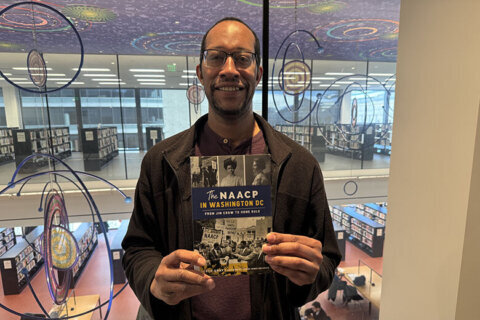Dozens of members of the public, teachers, former students and police officers shared their feelings about the presence of police in D.C. public schools as District leaders listened.
The Council of the Whole held a more than five-hour-long hearing Wednesday to listen to school stakeholders about their thoughts on the recommendations of the D.C. Police Reform Commission, which issued its report two weeks ago.
The report, which took seven months to prepare contained more than 90 recommendations calling for, among other things, a reduction in the size of the Metropolitan Police Department and a decentralization of the police as the go-to responders for public safety.
“The D.C. Police Reform Commission’s recommendation of eliminating the school safety division, specifically the school resource officer program is wrong … what the commission missed is that our school resource officers work with us to push back back against systemic racism and bias that target our youth,” said Assistant Principal of Eastern Senior High School Benjamin Davis.
The majority of school leaders who testified to Council Chair Phil Mendelson joined Davis in supporting the idea of keeping school resource officers (SROs) in schools.
Davis shared a story of a freshman who struggled all year to engage with a school she didn’t know and educators she’d never met. Davis said when the girl returned to in-person instruction, she recognized the SROs assigned to Eastern from their previous assignments at her middle school.
“She knew them because middle school was hard for her. She got in lots of arguments, lots of fights, and she didn’t do well in classes. However, our SROs were her SROs. They sat in mediation with her, spoke to her mom about issues going on in the community, and took an interest in her life and her success. The young lady that I’m speaking of has not missed a day of class since,” Davis said.
Robert Lee, a school resource officer, shared that after graduating from Ballou High School and remaining in the community, he felt personally inclined to seek out the assignment to protect students after a Ballou student’s killing years ago.
“Because of my relationship as being a football coach, as well as a security officer, I create relationships with students by helping them get into school. By coming to me with any problem that they may have, they may not want to talk to, with other adults in the building,” Lee said.
Louis Davis, who represents school resource officers for the Service Employees International Union Local 32BJ, said it rejects the commission’s recommendation on counseling the security contract in “giving preference to rehiring in the new, reimagined roles.”
“We did tons of public outreach to many DCPS parents in the larger public, and we got a resounding ‘no,’ that they’ve rejected the notion of reducing school security. We believe the Commission’s view is a minority opinion, one that is not organic from DCPS parents or D.C. residents,” Davis said.
The school resource officer program is run by D.C. police, not D.C. Public Schools but it’s unclear if the school system plans to take action on any of the testimony shared during the hearing.
Lindsey Walton, communication’s director for Council Chair Mendelson’s office, said because the public hearing was not responding to proposed legislation, it’s unclear what — if any — action will be taken going forward.
Council members who listened to public comment could propose legislation off of something they learned, or DCPS could move forward with changes, she said.
There were those opposed to police officers in schools who shared their views during the hearing as well. Ward 8 teacher Mary Balla went against other educators and said she believes the policing structure should be completely dismantled at all schools.
“Having police presence in-house does not facilitate de-escalation or foster a safe learning space. Rather, it creates an environment that is threatening to our most vulnerable students and directly contributes to the school-to-prison pipeline,” Balla said suggesting the city re-envision the role of resource officers in schools.
Miya Walker with Black Swan Academy agreed with the idea of considering student needs and filling them with support roles rather than asking a police officer to take on the emotional support of kids.
“We must continue to reimagine safety and support for youth with evidence-based models and public health approaches our youth need,” Walker said. “For those who have hesitancies around removing police from schools, we must ask why we are so tied to a system that reinforces white supremacy? Policymakers must acknowledge the ongoing detriment police presence poses to black students’ mental well-being and sense of safety in schools.”
Shawn Williams, a teacher in Cumberland County, Maryland schools, shared his personal experience with how an SRO changed his life as a student at Eastern High School in D.C.
“SRO’s were very effective when it came to children like me, because of the time that that officer took to talk to me, to make sure that I was doing the right things, to make sure that, you know, I was okay at the house,” Williams said of Officer Andre Smallwood. “He had no idea I was going through things, but he fed me. He made sure I had prom and made sure that I didn’t have to worry about anything.”
Editor’s Note: A previous version of this story incorrectly indicated the SRO program is run by DCPS. It has been changed to correct the error.








